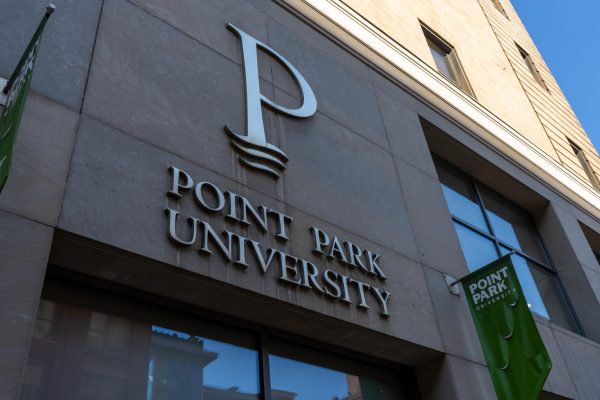USG reaches out to student body for feedback, tenatively plans to change club funding process
October 16, 2019
The United Student Government (USG) is looking to rebrand the organization and some of its key practices.
USG sent out an email via Campus Announcements on Friday, Oct. 11 seeking student feedback on potential changes the organization is exploring. A link to a PointSync survey called “Funding and Name Change Referendum” was included in the email. It asked for student involvement in clubs, students’ preferences for how money is allocated to clubs and organizations and students’ thoughts on proposed alternative names for USG. The survey is available until Friday, Oct. 18.
This referendum was sent to students in the middle of the fall semester. Vice President of USG, Alexa Lake, said that the timing of this was purposeful.
“We wanted students and clubs to have a sense of what the status quo is instead of pushing changes too early in the semester,” Lake said. “We find ourselves at an equilibrium where everyone is settled, and we still have time to implement reforms before spring.”
For most student organizations, their primary source of funding comes from USG. Expenses for campus events, food and other items for meetings are just some things covered under a typical budget; however, under the current funding system, every expenditure has to be approved by USG. USG uses request-based funding, which has been the standard for several semesters. Request-Based Funding requires clubs to convince USG to provide funding by submitting a “quote” of their requested funds, and clubs do not know the exact amount of funds they will receive until the funding meeting, after which they can make appeals.
The alternative being proposed is budget-based funding. Clubs and organizations would receive advanced notice of their funds before the beginning of each semester, and there would be less direct USG oversight. In this system, club leaders would have to keep records of attendance and the kinds of events they hold throughout the semester. If approved, USG would start following this model for the spring 2020 semester.
“Simply, request-based funding allocates more money to clubs who are better able to convince the financial committee of their needs. Under budget-based funding, clubs would receive more money if they…provide more hours of engagement for more students and…spend more of what they are allocated in a [funding] period,” a statement in the referendum said.
“Engagement” is not exclusive to club members and their attendance. Clubs and organizations would also have to track attendance to open campus-wide events held over the semester.
“There are two things USG should care about when funding: student engagement and utilization of funds,” Lake said. “A club with few members that provides events and engagement to many will not be hampered by low official membership. This system, in my view, will permit new organizations to flourish and grow faster than before.”
In request-based funding, clubs or organizations can lose funds if they do not properly fill out forms like the APF-100, whereas with budget-based funding, clubs will lose funds if they do not track meetings, attendance and event hours.
According to Vice President Lake, USG is in favor of the budget-based funding method.
“The current budget system takes quite a bit of manual and subjective work on our and student organizations’ behalf. All I’ve heard is support for a budget-based system, which would eliminate redundant control over how clubs run and empower them to operate without strict USG oversight,” Lake said. “This is the final step to determine whether we should move forward with this improvement.”
While the questionnaire is being called a referendum, technically it is not as much. The term “survey” is more appropriate to describe USG’s inquiry. Lake and USG President Jake Berlin said that USG would take student feedback into serious consideration.
“The referendum is not a vote, per se, but a means of analyzing how open to change different segments of the student body are,” Lake said.
“This was done after an audience member at [one of] the meeting[s] suggested we reach out to students for feedback. I think it’s a good idea when the issues are this big,” Berlin said. “We don’t need an entire campus worth of input on buying staplers for the office, but it is nice to have engagement when it comes to a decision of this magnitude.”
According to Berlin, he and Vice President Lake have been working on budgetary reform since the summer.
“Every year since I was a freshman, I have heard clubs express concerns about the funding process,” Berlin said. “Past USG Presidents tried to make changes but there were always people who were unhappy. We’re trying to minimize the amount of unhappiness. We understand that no system will ever be perfect but we are trying to find the best scenario for a majority of clubs.”
Berlin is passionate about another possible change to USG: the actual title of the organization. Student Government Association (SGA), Association of Student Government (ASG) and Government of Point Park University (GoPPU) are among the proposed alternatives. The survey also includes a form for students to submit their own ideas for names.
“For years, USG has been seen as self-serving rather than student-serving. When people hear the phrase ‘USG’, their brain shuts off because people are tired of hearing about it. We wanted a fresh start to rebrand ourselves and allow us to reintroduce ourselves to the students,” Berlin said. “Like any corporation that redesigns their logo or public presence, we wanted something simple and approachable. ‘USG’ is actually confusing outside of Point Park—some schools use it to mean Undergraduate Student Government, University Student Government, etc. ‘SGA’ is used by most universities and is commonly accepted as standard in Pittsburgh. We are the outlier and we wanted to be more consistent.”
Berlin likes that GoPPU removes the word “student” from the organization name, which he said could lend to better legitimacy for the organization, and that the acronym could perhaps add school spirit.
“Either way, whether it’s GoPPU or SGA or something else that the students come up with, the majority of our senate and the entirety of the executive cabinet believes the name needs to change,” he said.
The survey also included options where students could respond with their indifference to the new options or state their preference for the current budgeting system and organization name.
“This conversation needs to happen now because funding changes and name changes are big decisions that will outlast us once we’re gone,” Berlin said. “I wanted to leverage all of the student enthusiasm from the last election when we saw more support for change than ever before.”
According to Lake, last semester’s election also inspired her budgetary reform plans.
“The funding change has been my passion project from election. Jake has been the main proponent of a name change,” she said. “These projects are separate, but together we feel that they can fundamentally change how USG and the student body interact.”















